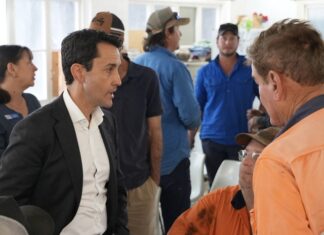There is a dearth of affordable accommodation in Noosa for workers, low income households, persons with a disability, and families escaping domestic violence.
Noosa Chamber of Commerce President Ralph Rogers pointed out, “Noosa businesses are having difficulty attracting staff to Noosa due to the high cost of housing. This puts a damper on the local economy.
“Workers have to live elsewhere and bear the cost of driving in, thereby also increasing traffic congestion and parking issues. Public transport is inadequate to cater for varied work hours and locations.”
As a result of migration during the height of the COVID pandemic, Noosa sale prices, rents and occupancy went sky high.
According to ABS data, in December 2023 the median house and unit prices were $1,235,000 and $937,000 (compared with $600,000 and $567,000 in the rest of regional Queensland) and median house and unit rentals were $850/week and $650 /week (compared with $550 and $460 in other Queensland regions).
Only five of the sales (0.3 per cent) and 36 rentals (2.4 per cent) were affordable to low income households.
Sale prices and rental prices are a function of supply and demand. With Noosa Shire having a constrained urban footprint, opportunity to increase supply is limited. The South East Queensland Plan and Noosa Plan both look to increase supply by introducing higher density in some areas.
Ralph Rogers said, “Even with more supply, when new dwellings are not restricted specifically for workers or other needy groups, prices quickly escalate, as can be seen in the new Noosaville developments in Eumundi-Noosa Road and Hofmann Drive, where unit prices range around the $1million mark for small units.”
Successive State governments have sold off state-owned social and community housing and the National Rental Affordability Scheme is ending now.
The outcome is reduced housing for needy people. They are forced to look for market-priced rentals, putting demand pressure at the lower end of the market with subsequent knock on effects upwards.
Noosa Council approved a Housing Strategy in November 2022 with 48 recommendations to address housing diversity and affordable housing, including for workers. The recommendations included:
• Seek to encourage housing specifically suitable for workers close to places of work.
• Develop programs to encourage more efficient use of existing housing stock through means of sharing houses and encouraging secondary dwellings.
• Implement or support a program to accommodate key workers. Work with Industry on these programs.
• Ensure housing designed for key workers is within proximity to employment.
• Encourage large businesses and government departments that are developing or
redeveloping their own land to include a component of employee housing for key workers.
But there has been little progress. Several applications aimed at providing affordable housing in Tewantin, Cooroy and Noosa Heads were knocked back by Council, justified either by selected Noosa Plan rules or in response to a minority group of objectors. No effort was made to find win-win solutions to facilitate good affordable housing outcomes.
In 2022-23 council approved only 165 houses (34 less than the previous year) and 75 units (74 less than the previous year). Some of those houses are likely replacing already existing houses, so do not increase supply or help reduce prices.
In the 2020 Noosa Plan, Council made short term letting ‘inconsistent’ in whole houses (i.e. unlikely to get council approval). But council enforcement of this has been found wanting, with a public outcry for council action. Seemingly the Noosa Plan is not leading to the promised outcome of making more permanent rentals available.
It is little wonder that the State government proposed a Housing Availability and Affordability Bill to allow the State Government to at times override council planning schemes in order to facilitate the development of affordable housing. The public (and councils) had the opportunity to submit feedback to the initial Bill in 2023 and more recently, in April and May, to related regulations, guidelines and rules.
The May council submission made some important points. The State proposed that at minimum 15 per cent of any ‘state-facilitated development’ will need to provide affordable housing, but ‘affordable’ is not clearly defined, and there appear to be no rules to guarantee ongoing affordability.
Ralph Rogers stressed, “The State government and Noosa Council need to work urgently and collaborate with the business community to identify housing and related transport solutions to specifically target the needs of workers and our businesses.”
For more information about Noosa Chamber of Commerce & Industry and to join see www.noosachamberofcommerce.com.au
THE PROPOSED NOOSA PLANNING SCHEME CHANGES EXPLAINED
Noosa Chamber of Commerce are pleased to offer a plain English explanation of the proposed amendments to the Noosa Shire’s planning Scheme. Will the changes support my business and our viability? What might be the impact on my commercial property’s future use?
This is a not to be missed opportunity to get a high level understanding of the implications for your business if/when these amendments become embedded in town planning approvals.
Guest speaker Russell Green of RG Strategic will present the session which will be a high level and detailed review of the proposed changes.
“You don’t really know how the town plan will affect you until you want to expand your business or redirect the use of your property,” says President Ralph Rogers.
“I encourage every business and commercial property owner to attend.”
Tickets for this not-to-be-missed in depth seminar are available via the Chambers website. The seminar to be held at the Boathouse is scheduled for 5.30pm on 25 June 2024.
Members and non-members are all very welcome.









